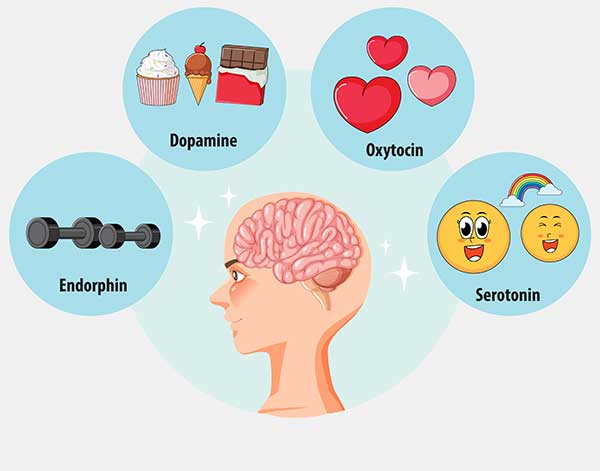Happy chemicals refer to neurotransmitters in the brain that play key roles in regulating mood, emotions, and overall well-being.
 Image by Freepik
Image by Freepik
Here's a more detailed overview of the happy chemicals:
1. Dopamine:
- Function: Dopamine is associated with pleasure, reward, motivation, and reinforcement of behaviors.
- Roles: It plays a key role in the brain's reward system, reinforcing behaviors linked to pleasure and motivation. It's released in anticipation of and in response to rewarding experiences.
- Impacts: Dopamine influences mood, attention, learning, and movement. It's linked to feelings of satisfaction, achievement, and pleasure.
- How to Boost Dopamine:
- Set and achieve goals - Accomplishing tasks, even small ones, triggers dopamine release.
- Seek novelty - Trying new things or exploring new experiences can stimulate dopamine production.
- Exercise - Regular physical activity can increase dopamine levels.
- Meditation - Mindfulness practices and meditation have been linked to dopamine release.
2. Serotonin:
- Function: Serotonin regulates mood, social behavior, appetite, digestion, sleep, memory, and sexual desire.
- Roles: It's involved in the regulation of emotions, perception, and overall well-being. It contributes to feelings of happiness, relaxation, and well-being.
- Impacts: Imbalances in serotonin levels can lead to mood disorders like depression, anxiety, and sleep disturbances.
- How to Boost Serotonin:
- Sunlight exposure - Sunlight triggers the release of serotonin, so spending time outdoors can help.
- Healthy diet - Foods like bananas, nuts, seeds, and dark chocolate contain nutrients that support serotonin production.
- Exercise - Physical activity, especially aerobic exercise, can increase serotonin levels.
- Socializing - Engaging in positive social interactions and forming meaningful connections can boost serotonin.
3. Oxytocin:
- Function: Oxytocin is often referred to as the "love hormone" or "bonding hormone."
- Roles: It's released during social bonding, intimate interactions, childbirth, breastfeeding, and other instances of human connection. Oxytocin fosters trust, empathy, and social bonding.
- Impacts: It plays a crucial role in forming and maintaining social relationships, reducing stress, and promoting feelings of trust and attachment.
- How to Boost Oxytocin:
- Physical touch - Hugging, cuddling, or any form of physical affection can stimulate oxytocin release.
- Positive social interactions - Sharing quality time, bonding, and empathizing with others fosters oxytocin release.
- Acts of kindness - Engaging in acts of generosity or helping others can elevate oxytocin levels.
- Pet interactions - Spending time with pets, especially petting and playing, can increase oxytocin.
4. Endorphins:
- Function: Endorphins act as natural painkillers and stress relievers.
- Roles: They are produced in response to stress, pain, and physical exertion. Endorphins bind to opioid receptors in the brain, reducing discomfort and producing feelings of pleasure or euphoria.
- Impacts: Endorphins are released during activities like exercise, laughter, meditation, and other experiences that cause excitement or pleasure. They contribute to feelings of well-being and relaxation.
- How to Boost Endorphins:
- Exercise - Physical activity, particularly high-intensity workouts, triggers the release of endorphins.
- Laughter - Enjoying humor and laughter can increase endorphin levels.
- Eating certain foods - Spicy foods, dark chocolate, and foods high in omega-3 fatty acids can stimulate endorphin release.
- Meditation - Mindfulness practices and meditation have been linked to increased endorphin production.
These chemicals collectively contribute to regulating emotions, mood, motivation, social bonding, and overall happiness. Balancing and nurturing these chemicals through activities, relationships, and positive experiences are essential for emotional well-being and a sense of fulfillment in life.